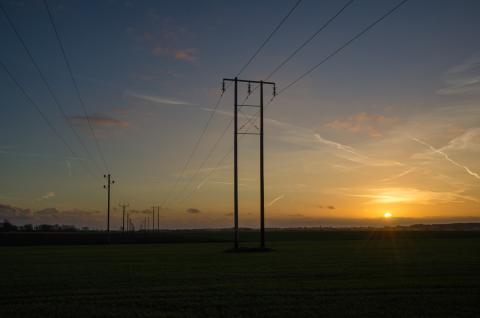
A Message from General Manager Ken Schlimgen
The extreme cold we experienced in February brought back memories of growing up on my family’s farm near Dimock. I recall helping my father with chores, shivering in the cold while my fingers and toes ached and at times go numb. At the same time, I could not understand how my dad could keep working most times without wearing gloves. I was always amazed at how hard my father worked to fix equipment and care for livestock in the most extreme conditions.
Keep in mind our gloves and shoes were not like the options we have today. Gloves were made of cotton, got wet easily, and I remember a few holes in the fingertips. We would cover our uninsulated shoes with recycled bread sacks to keep them dry inside a 5-buckle rubber boot. It was not uncommon for the rubber boot to have a makeshift patch just to delay the water from getting inside.
As you know, cold weather is hard on equipment and livestock. It can also put lives at risk. We are fortunate to have modern equipment to help us get through these weather events a bit easier than my father’s experience. Modern equipment is a lifesaver, but it does cause us to be more reliant on electricity and other forms of energy, especially during extreme weather.
Because of this reliance, it is easy to understand why the possibility of rolling blackouts created a lot of anxiety for all of us. Our employees fielded hundreds of questions from people trying to learn if and when they would be affected. Our employees had the same concerns but those decisions were being made by others at a moment’s notice without time for advance notification.
Our power grid was in a fragile state. The need for electricity was pushing the system’s ability to provide it. The extreme cold affected all types of generation. Some generation was shut down and some generation was operating on a limited fuel supply. The only option available to keep the grid running was controlled outages. Substations were staged off in a controlled method to keep the system from failing.
Central Electric’s membership did not experience a rolling blackout during this weather event. Your cooperative urged voluntary energy conservation and we allowed our load control program to control energy use beyond our normal limits. I apologize if you were inconvenienced as a result of these actions.
I must say thank you to our commercial members, Hutterite colonies, and TransCanada Pipeline. These members stepped up and operated on emergency generators or shut down operations during this event. I am convinced their actions helped prevent rolling outages to the rest of our membership. Truly a testament to the value of working together to accomplish something we cannot accomplish alone.
Now that the power grid is back to normal, the attention is shifted to prevention and how this event has impacted utility bills. As member owners of a cooperative power supply, we are shielded from the huge bills that some consumers are experiencing. Because we are owners of East River Electric Cooperative and Basin Electric Power Cooperative, we avoid the wild fluctuations in the energy market.
The Southwest Power Pool, an entity that oversees electric transmission, has much to learn from the events in February, and there are certainly areas that can be improved upon. You can be sure that your cooperative will work with the other members of the Southwest Power Pool to take the steps needed to prevent this situation in the future.
Some good news to share is the active number of COVID-19 cases has been steadily dropping for the past several weeks. This is great news, but please do not let your guard down. While we wait our turn to be vaccinated, let’s keep washing our hands, maintaining social distance and following the appropriate safety protocols for our situations.
Have a happy Easter holiday, and until next month, stay safe!
